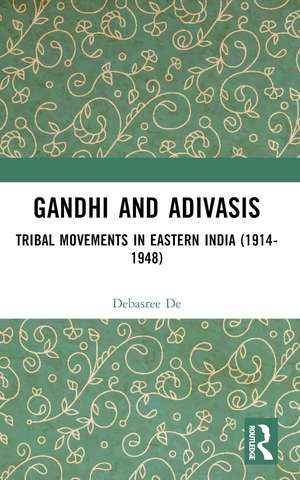Gandhi and Adivasis: Tribal Movements in Eastern India (1914-1948)
Autor Debasree Deen Limba Engleză Paperback – 26 aug 2024
Please note: Taylor & Francis does not sell or distribute print edition in India, Pakistan, Nepal, Bhutan, Bangladesh and Sri Lanka.
| Toate formatele și edițiile | Preț | Express |
|---|---|---|
| Paperback (1) | 388.68 lei 6-8 săpt. | |
| Manohar – 26 aug 2024 | 388.68 lei 6-8 săpt. | |
| Hardback (1) | 998.71 lei 6-8 săpt. | |
| Manohar – 7 iul 2022 | 998.71 lei 6-8 săpt. |
Preț: 388.68 lei
Nou
Puncte Express: 583
Preț estimativ în valută:
74.37€ • 77.81$ • 61.78£
74.37€ • 77.81$ • 61.78£
Carte tipărită la comandă
Livrare economică 02-16 aprilie
Preluare comenzi: 021 569.72.76
Specificații
ISBN-13: 9781032312460
ISBN-10: 1032312467
Pagini: 234
Dimensiuni: 138 x 216 mm
Greutate: 0.43 kg
Ediția:1
Editura: Manohar
Colecția Routledge
ISBN-10: 1032312467
Pagini: 234
Dimensiuni: 138 x 216 mm
Greutate: 0.43 kg
Ediția:1
Editura: Manohar
Colecția Routledge
Public țintă
AcademicCuprins
1. Changing Perspectives on Adivasi Predicaments: Gandhi, Verrier Elwin and Amritlal Thakkar 2. Impact of Gandhian Ideology on the Tribal Movements of Chota Nagpur in Twentieth Century 3. Conflicting Forces behind the Jharkhand Movement: Gandhi and Jaipal Singh 4. Disillusionment and Disappointment: Evaluation of the Role of Gandhi in Consolidating Adivasi Movements in Chota Nagpur Region 5. Adivasi Movements after Gandhi: The Relevance of Gandhism in Twenty-first-Century Adivasi Movement—The Ideological Shifts 6. A Postscript: Gandhi in Adivasi Folk Traditions
Notă biografică
Debasree De is an Assistant Professor, Department of History, Maharaja Srischandra College, Kolkata, West Bengal.
Descriere
This work focusses on the first three Adivasi movements in Eastern India during Gandhi’s lifetime and the current movements against forceful displacement by POSCO, Vedanta and others, in order to comprehend his ideological impact on Adivasi movements of today.
Please note: T&F does not sell print edition in South Asia.
Please note: T&F does not sell print edition in South Asia.
